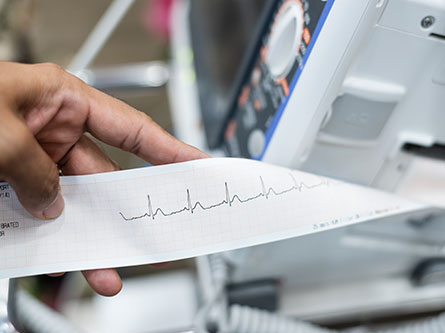An electrocardiogram, also called an EKG, is a simple test to capture electricity generated by your heart. An EKG can be done in any office setting. It helps health care providers diagnose very serious conditions.
But if you've never had an EKG, you may be wondering what to expect. Surabhi Atreja, cardiologist at UC Davis Health, walks you through the process and explains why it's an important medical test.
What does an EKG check for?
EKG checks your heart's activity over a short period of time. It records the electrical signals that travel through your heart each time it beats.
EKG can check how fast your heart is beating, whether you have a regular or irregular heartbeat and the strength and timing of the electrical signals in your heart.
If you have heart problems that come and go, you may be asked to wear a small, portable EKG to monitor your heart's activity.
Why does a person get an EKG?
Your cardiologist (heart specialist) or primary care provider may recommend an EKG to check for a variety of conditions. The most common symptoms that might prompt an EKG test include:
- chest pain
- shortness of breath
- dizziness
- heart rate that's too slow or too fast.
Learn why you should partner with a primary care provider for your health
What conditions can an EKG help diagnose?
EKG can help providers diagnose serious conditions of the heart. These can include:
- acute heart attack
- enlargement of the heart
- irregular heart rhythms (arrhythmia)
- heart failure
- heart valve disease
- congenital heart defects
See how we partner with you for heart and vascular care
Know the heart attack symptoms and how to keep your heart healthy
What is an ECG vs. EKG?
An EKG test is also known as an ECG. EKG is based on the German spelling of elektrokardiogramm, according to Medline.
What should you not do before an EKG?
There's not much you need to do to prepare for an EKG. Typically, you don't need to fast (not eat) before an EKG. However, you should avoid exercise before the test and refrain from drinking cold water. These two things could lead to inaccurate results.
Get this simple 8-week exercise plan for a healthy heart
What is the process for an EKG?
An EKG is a painless test. You will be taken into a room and asked to remove clothing from the waist up. You will be given a gown or sheet to drape over you and will be asked to lay on a stretcher or a bed.
Now you get to just relax. An EKG technician will come into the room and uncover your chest. They will place some stickers (electrodes) across your chest at specific points. The electrodes are attached by wires to a machine. You will be asked to lie very still while your heart's electrical activity is recorded on a computer. The results are printed out on a paper.
How long does an EKG take?
An EKG usually takes less than 10 minutes once you're all set with the electrodes on your chest.
What can you expect after an EKG?
EKG results will come back and show either normal or abnormal. If your EKG is abnormal, you're often referred to a cardiologist. Your provider may also want to have further testing done. This could be another EKG, stress test or evaluation for a pacemaker.
How can you get an EKG test at UC Davis Health?
If you have concerns about your heart, talk to your primary care provider to find out if an EKG test is right for you. They can give you a referral to schedule an EKG or to see a cardiologist.
Find a UC Davis Health cardiology clinic near you
This blog was medically reviewed by cardiologist Surabhi Atreja.




